Other Parts Discussed in Thread: TPS92621-Q1
Hello Team,
This thread has been locked.
If you have a related question, please click the "Ask a related question" button in the top right corner. The newly created question will be automatically linked to this question.
Hello Team,
Hello Hailee,
Thanks for your response!
1) Please share the required spice model before 26-02-2024, considering the urgency.
2) When single branch single LED gets open other all LED to be disabled (OFF). Like One fail all fail condition.
Thanks,
Mohammed Khalif
Hi Mohammed,
1)I am afraid that I can't provide the spice model which operates at -30°C to 85°C, from my understanding, this Pspice mode should be the ideal model.
2) If you don't need Single-LED-short diagnostic, I'd like to recommend the TPS92621-Q1, it can provide the OFAL and the thermal sharing via RES.
For TPS92610-Q1, if you need the single-led-short diagnostic, with Rp, I am afraid that device can't work normally.
BR,
Hailee.
Hello Hailee,
1) When simulating the TPS92610-Q1 spice model above +30°C the below mentioned error was observed:
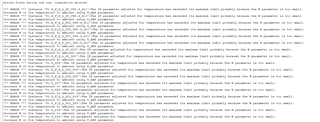
Error obtained:
*** ERROR *** Instance 'U1.X_F_D_L_SC_U48.d_d11':The IS parameter adjusted for temperature has exceeded its maximum limit probably because the N parameter is too small.
Increase N or fix temperature to ambient using T_ABS parameter
*** ERROR *** Instance 'U1.X_F_D_L_SC_U48.d_d10':The IS parameter adjusted for temperature has exceeded its maximum limit probably because the N parameter is too small.
Increase N or fix temperature to ambient using T_ABS parameter
*** ERROR *** Instance 'U1.X_F_D_L_SC2_U48.d_d11':The IS parameter adjusted for temperature has exceeded its maximum limit probably because the N parameter is too small.
Increase N or fix temperature to ambient using T_ABS parameter
*** ERROR *** Instance 'U1.X_F_D_L_SC2_U48.d_d10':The IS parameter adjusted for temperature has exceeded its maximum limit probably because the N parameter is too small.
Increase N or fix temperature to ambient using T_ABS parameter
*** ERROR *** Instance 'U1.X_F_D_L_SC1_U48.d_d11':The IS parameter adjusted for temperature has exceeded its maximum limit probably because the N parameter is too small.
Increase N or fix temperature to ambient using T_ABS parameter
*** ERROR *** Instance 'U1.D_D14':The IS parameter adjusted for temperature has exceeded its maximum limit probably because the N parameter is too small.
Increase N or fix temperature to ambient using T_ABS parameter
2) In TPS92610-Q1, by connecting the FAULT pin of the two IC's (TPS92610) without the Rp resistor, will the OFAF function can be detected?
Hi Mohammed,
1) Generally, the Pspice model is used to provide operational evaluation under common conditions, if you have some special requirements, maybe you can do some on-board testing directly.
2) Yes, this device can support OFAF(one-fails-all-fail) function by connecting the FAULT pins together.
BR,
Hailee.
Hello Hailee,
1) Considering the spice model urgency, Is it possible to share the customized spice model that operates at -30°C to 105°C.
2) From the datasheet, I could understand that if the Rp resistor is used then the OFAF will not be functioned? Is it right?
Thanks
Mohammed Khalif
Hi Mohammed,
1) Sorry, we don't have this special spice model.
2) Yes, you are right, the Rp path can't be shut down by PWM signals or Fault protection.

BR,
Hailee.
Hello Hailee,
Thanks for confirmation.
1) Please share the latest spice model of TPS92610-Q1.
2) How to disable the Auto recover mode (I_retry) during the OFAF condition in TPS92610-Q1.
Thanks and Regards,
Mohammed Khalif
Hi Mohammed,
1) The current version is shown on ti.com.TPS92610-Q1 data sheet, product information and support | TI.com please see the picture below.

2) Why do you want to disable the auto-recover mode? If you want to disable this retry current, you can pull the EN pin low to turn off the output channel. This way, even if the fault is cleared, the device will not recover.
Many thanks!
BR,
Hailee.
Hello Hailee,
1) I understand that the provided spice model in the TI website for TPS92610 is the latest one. (But this spice model i supporting only in the mentioned temperature range (-10°C to +25°C)
2) We have a OFAF scenario in which if one LED is disabled another LED also to be disabled by connecting the FAULT lines of the 2 TPS IC's.
(Note: LED current of 2 TPS are different)
when doing this OFAF analysis, we could observe the spikes in LED current for some short times repeatedly. Is there any method to disable the Power on reset in the TPS92610 IC. please confirm
Thanks,
Mohammed Khalif
Hi Mohammed,
What do you mean "the spikes in LED current for some short time repeatedly", do you have any test waveforms? and what kind of OFAF analysis do you perform? and could you share the full schematic?
BR,
Hailee.
I have attached the schematics model below:
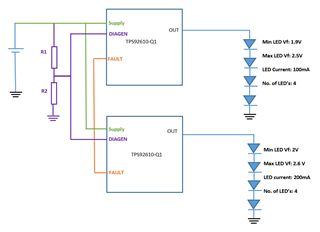
Along with the above connections, the PWM is externally pulled up with 10K resistor and the SSH a& SSL is connected with voltage divider.
In the above schematics, when the LED from the 1st TPS IC is open then the other LED connected in 2nd TPS IC is generating below graph result. Instead of continuos low signal (0mA or less) repeated current spikes appeared with short intervals (Blue color)
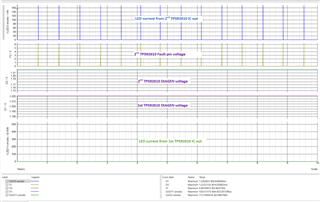
Thanks and Regards,
Mohammed Khalif
Hi Mohammed,
BR,
Hailee.
Hello Hailee,
1) I have attached the waveform results in the below image:
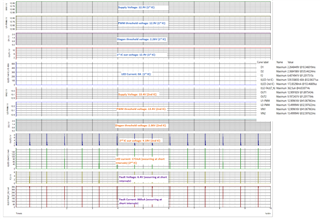
2) Please check the above image.
3) I have added the resistor values and SSL connections in the below image:
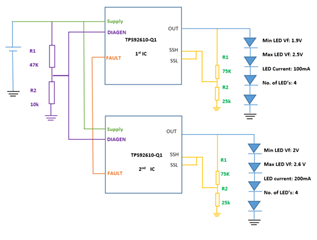
The supply voltage range is 9-16V. In the specified voltage range if 1st IC LED is open then the 2nd IC LED current obtained with spikes in short interval. (please check above graph result).
Thanks and Regards,
Mohammed Khalif
Hi Mohammed,
The Mechanism of open fault detection is shown below.

BR,
Hailee.
Hello Hailee,
In the below schematic reference, I have checked the fault signal (high/low) using 1 TPS92610-Q1 IC during OFAF condition:
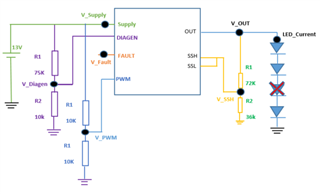
Also, I have captured the probe results below:
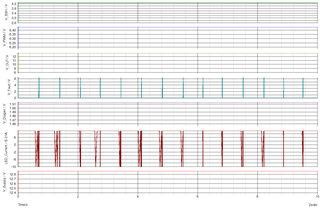
During OFAF condition, the fault signal is not setting to low consistently. Please check the above waveform result attached.
Note: Please click on the image for the expanded view.
Thanks,
Mohammed Khalif
Hi Mohammed,
Please also zoom in the Vout - like Vsupply, and zoom in only 1 or 2 cycle in time - like ms/div.

BR,
Hailee.
Hi Mohammed,
It is weird that the Fault signal is constantly being toggled and the LED current varies from 10mA to -10mA.
BR,
Hailee.
Hello Hailee,
We have checked with IC2 and same output waveform like IC1 was obtained for FAULT pin during OFAF condition.
All the measurement points were already mentioned in the above shared block diagram with full schematics.
And currently we don't have the PCB file since we are checking the feasibility in simulation.
Thanks and Regards,
Mohammed Khalif
Hello Hailee,
In the below shared waveform, the LED current obtained is 10 x E^-24. and it is not in mA (Just want to let you know this information)
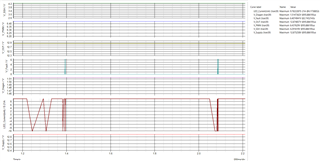
Hi Mohammed,
Thanks for the sharing, have you tried the test on a real board or the EVM board?
Are the Simulation results the same as the experimental results?
BR,
Hailee.
Hello Hailee,
Currently, we are checking the feasibility using simulation and we don't have the real board for the TPS92610-Q1 IC test.
Could you please reconfirm the above mentioned issue from you end and reconfirm (Default, Fault pin as floating, during OFAF condition the FAULT pin to be pulled low to "zero" instead of short interval spikes).
Thanks and Regards
Mohammed Khalif
Hi Mohammed,
Sure, as you can see from the datasheet, when the IC detects a fault condition, it will pull the FAULT pin LOW as shown in the picture (from a real board).
The device can work normally and there is no special issue. Please refer to the Figure 18 and 19.
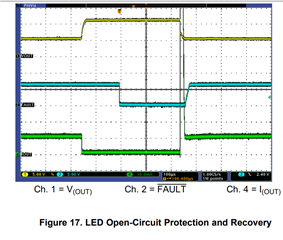
OFAF is a function that can be performed on multiple devices connected on the same fault bus.

BR,
Hailee.
Hi Mohammed,
Please ensure the external pullup current should be smaller than I((FAULT_pulldown). For your application, considering the max supply voltage -16V, I think 64kohm would be ok.

In addition, if you don't need the single-led fault function, I think TPS92621-Q1 could be a better option, this device can support OFAF and external shunt resistors.
BR,
Hailee.
Hi Mohammed,
There is no specific limit on the number of Rp resistors, it depends on the value of Rp and power on the Rp, you can use more Rp resistors to share a large power. Please refer to the 8.2.2.2 Detailed Design Procedure in the datasheet and use these formulas (7)~(10) to calculate the value of Rp.
BR,
Hailee.